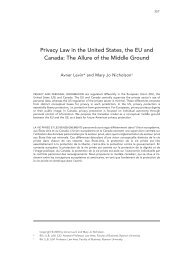Commentary on Fichte's “The Illegality of the Unauthorised ... - uoltj
Commentary on Fichte's “The Illegality of the Unauthorised ... - uoltj
Commentary on Fichte's “The Illegality of the Unauthorised ... - uoltj
Create successful ePaper yourself
Turn your PDF publications into a flip-book with our unique Google optimized e-Paper software.
166 university <strong>of</strong> ottawa law & technology journal www.<strong>uoltj</strong>.ca<br />
<strong>of</strong> <strong>the</strong> literary work. This is clear from Fichte’s emphasis that <strong>the</strong> author has two<br />
rights. The first is <strong>the</strong> right “to prevent any<strong>on</strong>e from completely denying <strong>the</strong><br />
author ownership <strong>of</strong> <strong>the</strong> form (i.e. to demand that every<strong>on</strong>e recognise her as <strong>the</strong><br />
author <strong>of</strong> <strong>the</strong> book).” The sec<strong>on</strong>d is <strong>the</strong> right “to prevent any<strong>on</strong>e from taking<br />
possessi<strong>on</strong> <strong>of</strong> her exclusive right in <strong>the</strong> form <strong>of</strong> <strong>the</strong> work and to make it <strong>the</strong>ir<br />
property.” 104 An author is not merely <strong>the</strong> pers<strong>on</strong> to whom a particular expressi<strong>on</strong><br />
is attributed. She is also some<strong>on</strong>e who is able to c<strong>on</strong>trol <strong>the</strong> use <strong>of</strong> her words, i.e.<br />
she is able to exert her right to property in <strong>the</strong>m in her interacti<strong>on</strong> with o<strong>the</strong>rs.<br />
From Fichte’s idea <strong>of</strong> mutual recogniti<strong>on</strong>, it necessarily follows that <strong>the</strong><br />
recogniti<strong>on</strong> <strong>of</strong> <strong>on</strong>e author’s right in her work entails <strong>the</strong> respect <strong>of</strong> <strong>the</strong> right <strong>of</strong><br />
o<strong>the</strong>r authors in <strong>the</strong>ir works. Fichte’s discussi<strong>on</strong> <strong>of</strong> <strong>the</strong> practice <strong>of</strong> attributing<br />
direct quotati<strong>on</strong>s dem<strong>on</strong>strates that <strong>the</strong> process <strong>of</strong> publicati<strong>on</strong> necessarily entails<br />
limiting <strong>on</strong>e’s own property claims by not infringing those <strong>of</strong> o<strong>the</strong>rs. Similarly, his<br />
discussi<strong>on</strong> <strong>of</strong> plagiarism emphasises that this process <strong>of</strong> mutual recogniti<strong>on</strong> is<br />
not an empirical recogniti<strong>on</strong> <strong>of</strong> a particular o<strong>the</strong>r, but ra<strong>the</strong>r a general principle<br />
underlying legality. A pers<strong>on</strong> is a plagiarist not merely because she copies <strong>the</strong><br />
works <strong>of</strong> known authors, but even when she copies from an an<strong>on</strong>ymous work. 105<br />
Legality thus involves <strong>the</strong> limitati<strong>on</strong> <strong>of</strong> my rights by recognising <strong>the</strong> rights <strong>of</strong><br />
o<strong>the</strong>rs, even if <strong>the</strong>y are not present before me. Or as Fichte will later state, “I can<br />
expect a particular rati<strong>on</strong>al being to recognize me as a rati<strong>on</strong>al being, <strong>on</strong>ly if I<br />
myself treat him as <strong>on</strong>e.” 106<br />
As previously menti<strong>on</strong>ed, <strong>the</strong> full articulati<strong>on</strong> <strong>of</strong> Fichte’s <strong>the</strong>ory <strong>of</strong> right<br />
is not elaborated until his later works such as Foundati<strong>on</strong>s <strong>of</strong> Natural Right. In<br />
this work, Fichte’s formulati<strong>on</strong> <strong>of</strong> <strong>the</strong> nature <strong>of</strong> right is very similar to Kant’s in<br />
<strong>the</strong> Metaphysics <strong>of</strong> Morals, though it appeared approximately six m<strong>on</strong>ths before<br />
Kant’s work. 107 Fichte’s formulati<strong>on</strong> reads: “Every relati<strong>on</strong> <strong>of</strong> right is determined<br />
by this propositi<strong>on</strong>: each pers<strong>on</strong> is to limit his freedom through <strong>the</strong> possibility<br />
<strong>of</strong> <strong>the</strong> o<strong>the</strong>r’s freedom.” 108 It is a deducti<strong>on</strong> <strong>of</strong> <strong>the</strong> c<strong>on</strong>cept <strong>of</strong> right from <strong>the</strong><br />
presuppositi<strong>on</strong> <strong>of</strong> intersubjectivity. 109 As we have seen, <strong>the</strong> c<strong>on</strong>diti<strong>on</strong> for <strong>the</strong><br />
possibility <strong>of</strong> self-c<strong>on</strong>sciousness is c<strong>on</strong>sciousness <strong>of</strong> <strong>the</strong> o<strong>the</strong>r. 110 Fur<strong>the</strong>rmore,<br />
<strong>the</strong> thought that every being is free requires that every pers<strong>on</strong> limit her freedom<br />
to accommodate <strong>the</strong> freedom <strong>of</strong> o<strong>the</strong>rs. 111 For Fichte, this relati<strong>on</strong>ship between<br />
two free human beings defines <strong>the</strong> juridical relati<strong>on</strong>ship. 112 Thus in c<strong>on</strong>ceiving <strong>the</strong><br />
realm <strong>of</strong> her own freedom, <strong>the</strong> individual must necessarily take into account <strong>the</strong><br />
limits <strong>on</strong> this freedom imposed by <strong>the</strong> necessity <strong>of</strong> recognising <strong>the</strong> freedom <strong>of</strong><br />
o<strong>the</strong>rs. 113<br />
104. Fichte, “Pro<strong>of</strong> <strong>of</strong> <strong>the</strong> <strong>Illegality</strong> <strong>of</strong> <strong>the</strong> Reproducti<strong>on</strong> <strong>of</strong> Books,” supra note 2 at para. 9.<br />
105. Fichte, “Pro<strong>of</strong> <strong>of</strong> <strong>the</strong> <strong>Illegality</strong> <strong>of</strong> <strong>the</strong> Reproducti<strong>on</strong> <strong>of</strong> Books,” supra note 2 at para. 11.<br />
106. Fichte, Foundati<strong>on</strong>s <strong>of</strong> Natural Right, supra note 1 at p. 44.<br />
107. Jean-Christopher Merle, “Eigentumsrecht,” in Jean-Christophe Merle, ed., Grundlage des Naturrechts<br />
(Akademie Verlag, 2001) 159–172 at p. 161. See also <strong>the</strong> editor’s note in <strong>the</strong> Cambridge editi<strong>on</strong> <strong>of</strong> Fichte’s<br />
Foundati<strong>on</strong>s <strong>of</strong> Natural Right, supra note 1 at vii.<br />
108. Fichte, Foundati<strong>on</strong>s <strong>of</strong> Natural Right, supra note 83 at p. 120: “Alles Rechtsverhältnis ist bestimmt durch<br />
den Satz: jeder beschränke seine Freiheit durch die Möglichkeit der Freiheit des Anderen.”<br />
109. Susan Shell, “‘A determined stand’: Freedom and Security in Fichte’s Science <strong>of</strong> Right,” (1992) 25:1 Polity<br />
95–122 at p. 97.<br />
110. Fichte points out that “<strong>the</strong> rati<strong>on</strong>al being cannot posit itself as a rati<strong>on</strong>al being with self-c<strong>on</strong>sciousness<br />
without positing itself as an individual, as <strong>on</strong>e am<strong>on</strong>g several rati<strong>on</strong>al beings that it assumes to exist outside<br />
itself, just as it takes itself to exist.” Fichte, Foundati<strong>on</strong>s <strong>of</strong> Natural Right, supra note 1 at p. 9.<br />
111. Fichte, Foundati<strong>on</strong>s <strong>of</strong> Natural Right, supra note 1 at p. 10.<br />
112. Shell, “‘A determined stand’: Freedom and Security in Fichte’s Science <strong>of</strong> Right,” supra note 109 at p. 99.<br />
113. Shell, “‘A determined stand’: Freedom and Security in Fichte’s Science <strong>of</strong> Right,” supra note 109 at p. 99.









